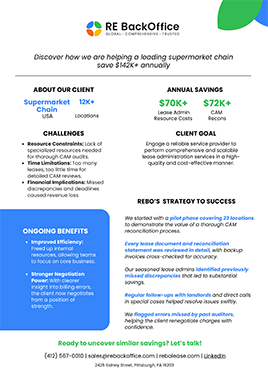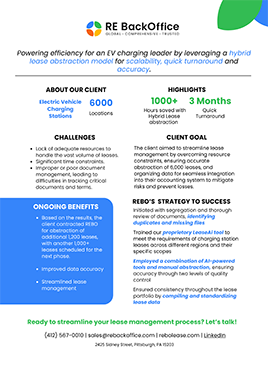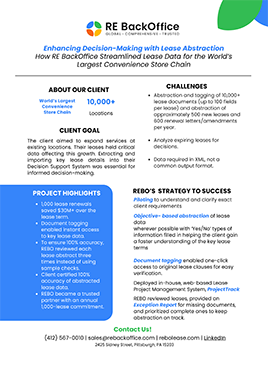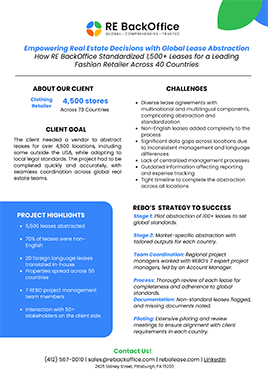
Understanding Lease Administration
Lease administration involves managing the terms and conditions of a lease agreement throughout its lifecycle. This includes everything from negotiating and drafting the initial lease contract to overseeing rent payments, handling maintenance requests, and ensuring compliance with lease terms. Lease administrators are responsible for keeping track of important dates, such as lease expirations and renewal options, and facilitating communication between landlords and tenants.
The Importance of Effective Lease Administration
Effective lease administration is essential for both landlords and tenants. For landlords, it helps maximize the value of their real estate investments by ensuring consistent rental income, minimizing vacancies, and reducing the risk of legal disputes. For tenants, it provides clarity and transparency regarding their lease obligations, helps them avoid costly penalties for non-compliance, and ensures that their space meets their operational needs.
Key Challenges in Lease Administration
Here are some common challenges associated with lease administration:
Complexity of Lease Terms:
Lease agreements can be highly complex, containing numerous clauses, provisions, and legal terminology. Understanding and interpreting these terms accurately requires specialized knowledge and expertise in real estate law. Lease administrators may face challenges in ensuring that lease agreements are drafted and executed correctly to protect the interests of both landlords and tenants.
Data Management and Documentation:
Lease administration involves managing vast amounts of lease-related data and documentation, including lease agreements, rent rolls, critical dates, and tenant communications. Organizing and maintaining accurate records can be challenging, especially for properties with multiple leases and tenants. Lease administrators must implement efficient data management systems and processes to track lease information effectively.
Rent Collection and Payment Tracking:
Collecting rent payments from tenants and tracking payment schedules can be challenging, particularly in cases of late or delinquent payments. Lease administrators must implement rigorous rent collection procedures and follow up promptly on overdue payments to ensure consistent cash flow and financial stability.
Compliance with Regulations:
Compliance with lease terms and regulatory requirements is essential in lease administration. However, navigating the complex landscape of real estate laws and regulations can be challenging, especially for properties located in multiple jurisdictions. Lease administrators must stay informed about evolving legal requirements and ensure that lease agreements comply with applicable laws and regulations to avoid legal risks and liabilities.
Tenant Relations and Conflict Resolution:
Managing tenant relations and addressing tenant concerns and disputes can be challenging for lease administrators. Conflicts may arise over issues such as lease terms, maintenance responsibilities, or rent increases. Lease administrators must possess strong interpersonal skills and conflict resolution techniques to resolve disputes effectively and maintain positive relationships with tenants.
Critical Date Management:
Tracking critical dates, such as lease expirations, renewal options, and termination deadlines, is crucial in lease administration. However, managing multiple leases with different critical dates can be challenging, increasing the risk of missed deadlines and potential penalties. Lease administrators must implement robust systems and reminders to ensure timely management of critical dates.
Property Maintenance and Repairs:
While property maintenance and repairs may fall under the responsibility of property managers, lease administrators must ensure that lease agreements clearly define maintenance obligations and coordinate with property managers to address maintenance issues promptly. Failure to address maintenance concerns can lead to tenant dissatisfaction and potential legal disputes.
Technology Integration and Adoption:
Incorporating technology solutions for lease administration, such as lease management software and automated reporting tools, can streamline processes and improve efficiency. However, implementing new technology solutions and ensuring staff adoption can be challenging. Lease administrators must provide adequate training and support to staff to maximize the benefits of technology in lease administration.
Addressing these challenges requires proactive management strategies, effective communication, and ongoing investment in staff training and technology. By overcoming these challenges, landlords and property managers can optimize lease administration processes and maximize the value of their real estate investments. However, many businesses find that managing lease administration internally can be resource-intensive and complex. This is where outsourcing lease administration services to a trusted lease administration service provider comes into play.
Strategic Advantages of Outsourcing to Expert Lease Administration Services
1. Cost Savings:
Outsourcing lease administration yields considerable cost savings for businesses across various dimensions. Internally managing lease administration necessitates the creation and maintenance of a dedicated team, involving expenses related to recruitment, training, salaries, benefits, and infrastructure. For small to medium-sized enterprises (SMEs), these costs can be disproportionately burdensome, diverting financial resources from core business activities.
Additionally, the overhead costs associated with managing lease administration internally include investments in technology infrastructure, software licenses, and ongoing maintenance. Conversely, outsourcing eliminates these fixed costs, allowing businesses to adopt a more variable cost structure where they only pay for the services utilized. Moreover, trusted lease administration service providers often benefit from economies of scale, spreading the fixed costs across multiple clients, thereby reducing the per-unit cost for each client.
2. Improved Accuracy and Efficiency:
Accuracy and efficiency are paramount in lease administration due to the complexity and volume of lease data involved. Professional lease administrators possess specialized knowledge and expertise honed through years of experience, enabling them to navigate intricate lease agreements with precision. They leverage advanced software solutions specifically designed for lease management, which automate routine tasks, minimize human error, and ensure data integrity. These tools facilitate the efficient handling of large datasets, enabling administrators to extract actionable insights and proactively manage leases.
Furthermore, outsourcing to specialized lease administration service providers grants access to best practices and industry benchmarks, enabling businesses to benchmark their performance against peers and identify areas for improvement. This continual process of refinement contributes to ongoing enhancements in accuracy and efficiency, ultimately driving operational excellence.
3. Enhanced Compliance:
Compliance with lease terms and regulatory requirements is non-negotiable in lease administration, as non-compliance can lead to severe consequences, including financial penalties, legal disputes, and damage to reputation. Outsourcing lease administration to trusted lease administration service providers mitigates these risks by leveraging their expertise in navigating the complex web of regulations governing lease agreements.
These service providers maintain a comprehensive understanding of local, state, and federal laws pertaining to real estate transactions, ensuring that lease agreements are drafted, executed, and managed in full compliance with regulatory requirements. Moreover, they implement robust internal controls and audit procedures to monitor compliance and mitigate potential risks proactively.
4. Access to Expertise:
Outsourcing lease administration grants businesses access to a multidisciplinary team of experts with diverse skill sets and domain knowledge. These professionals possess in-depth expertise in various facets of lease administration, including lease abstraction, portfolio optimization, financial analysis, and legal interpretation. They stay abreast of emerging trends, regulatory changes, and industry developments, continuously updating their knowledge base to deliver best-in-class services to clients.
Moreover, the collective expertise of the trusted lease administration service provider's team enriches the strategic decision-making process, as it provides stakeholders with a holistic understanding of the opportunities and challenges inherent in their real estate portfolio. By tapping into this reservoir of knowledge, businesses can make informed decisions that align with their overarching objectives and enhance their competitive advantage in the marketplace.
5. Scalability:
The scalability of lease administration operations is critical for businesses experiencing growth or fluctuations in their real estate portfolio. Outsourcing provides the flexibility to scale operations up or down in response to changing business needs without incurring significant upfront costs or organizational upheaval.
Trusted lease administration service providers offer customizable service agreements tailored to the unique requirements of each client, allowing businesses to access additional resources, expertise, and support as needed. Whether expanding into new markets, acquiring additional properties, or consolidating existing leases, businesses can rely on their outsourcing partner to seamlessly adapt to evolving circumstances and deliver consistent, high-quality service.
6. Increased Focus on Core Business Activities:
Outsourcing lease administration liberates internal resources, enabling businesses to redirect their focus and energies towards core business activities that drive revenue growth and foster innovation. By offloading the administrative burden of lease management to external specialists, organizations can optimize their resource allocation, enhance productivity, and accelerate time-to-market for strategic initiatives.
Moreover, outsourcing to trusted lease administration service providers fosters a culture of innovation and continuous improvement within the organization, as it encourages cross-functional collaboration, knowledge sharing, and creative problem-solving. By leveraging the expertise of external partners, businesses can tap into new perspectives, methodologies, and technologies, thereby unlocking new opportunities for value creation and differentiation.
7. Advanced Technology and Tools:
The adoption of advanced technology solutions is pivotal in modern lease administration, as it enables businesses to streamline workflows, enhance data accuracy, and drive operational efficiency. Outsourcing to specialized lease administration service providers grants businesses access to cutting-edge technology platforms, proprietary software applications, and analytical tools that may be cost-prohibitive to develop or implement in-house.
These technology solutions encompass a wide range of functionalities, including lease abstraction, document management, workflow automation, data visualization, and predictive analytics. By harnessing the power of these tools, businesses can gain real-time insights into their lease portfolio, identify trends and patterns, and make data-driven decisions that optimize resource allocation and mitigate risks.
8. Risk Management:
Risk management is a cornerstone of effective lease administration, as it helps businesses identify, assess, and mitigate potential threats to their financial, legal, and operational stability. Outsourcing to trusted lease administration service providers enhances risk management capabilities by leveraging their expertise, experience, and resources to proactively identify and mitigate risks across the lease lifecycle.
These service providers implement robust risk assessment frameworks, internal controls, and audit procedures to monitor key risk indicators, detect anomalies, and escalate issues for timely resolution. Moreover, they maintain comprehensive insurance coverage and indemnification provisions to protect clients against unforeseen liabilities, ensuring peace of mind and financial security.
9. Improved Decision-Making:
Informed decision-making is contingent upon access to timely, accurate, and actionable information. Outsourcing lease administration services provides businesses with a wealth of data, insights, and analytics that empower stakeholders to make strategic decisions with confidence and conviction.
These insights span various dimensions, including lease performance, occupancy costs, market trends, and competitor analysis, enabling businesses to optimize their real estate strategies, mitigate risks, and capitalize on emerging opportunities. Moreover, outsourcing fosters a culture of transparency, accountability, and collaboration, as it encourages stakeholders to engage in data-driven dialogue and consensus-building processes.
Conclusion
Outsourcing lease administration services to a trusted lease administration service provider offers numerous benefits, including cost savings, improved accuracy, enhanced compliance, access to expertise, scalability, increased focus on core business activities, advanced technology and tools, risk management, and improved decision-making. By leveraging the expertise and resources of professional lease administrators, companies can streamline their lease management processes, reduce risks, and achieve greater operational efficiency. As the complexity of real estate portfolios continues to grow, outsourcing lease administration becomes an increasingly valuable strategy for businesses seeking to optimize their lease management and focus on their core competencies.


